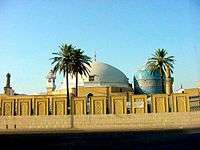Osman Nuri Topbaş
Osman Nuri Topbaş (born in 1942) is a Turkish Sufi master and author who lives in Istanbul, Turkey. He is the spiritual leader of Naqshbandi Sufi Order based in Erenköy, Istanbul.
Biography
He was born in 1942 in Erenkoy/Istanbul. His father is master Musa Topbas, and his mother is the daughter of H.Fahri Kigili, Mrs. Fatma Feride. He completed his first training in Erenkoy Zihni Pasha Primary School. He took special Qur'an lessons in his primary school years. He entered Istanbul Imam Hatip School (Religious High School) in 1953. In those years, this school was an important educational institution having Ottoman’s great plane trees which can be counted as masters M. Celaleddin Okten and Mahir Iz; thinkers like Nureddin Topcu who has trained in West. Master (Ustadh) Osman Nuri Topbas completed this school with his uncle and peer Abidin Topbas in 1960. In his high school years, he has taken lessons from teachers like M. Zekai Konrapa, Yaman Dede (Abdülkadir Keçeoğlu), Ahmet Davutoğlu, Mahmud Bayram, Ali Rızâ Sağman. In his Imam-Hatip years, he met Ustadh Necip Fazil. He was a regular follower of Necip Fazil’s talks and magazine “Büyük Doğu”. After completing Imam-Hatip School successfully, he was occupied with trade and industrialism. He did his military service as reserve-officer teacher in Siirt-Tillo, in 1962. During his duty, the love of being teacher fell to his heart and he started to take pleasure from caring for the teenagers.
After comeback from military service he found himself again in commerce and industry. But he has never broken off his connection with wisdom and charitable services. He has worked actively in “Dissemination of knowledge society” (Ilim Yayma Cemiyeti). His workplace was like a charity, supplying scholarship to students, helping the poor. After founding “Hudayi Foundation”, he carried these services to the foundation. He opened the service horizon of the foundation. With this foundation, he helped materially and spiritually to all youth coming from societies especially from Turkish republics.
Due to his interest in history, literature, religious science and poetry, he started his writing life in 1990. His books have been translated into many languages such as English, German, French, Spanish, Hungarian, Albanian, Kazakh and Azeri. He welcomes seminar, conference and panel offers from all over the world and shares his opinions.
He is married and father of four children. His books are published online for free in 43 languages: http://www.islamicpublishing.net
His Books
Some of his books have been translated into English:
- Islam: Spirit and Form
- Contemplation In Islam
- Prophet Muhammad Mustafa the Elect 1
- Prophet Muhammad Mustafa the Elect 2
- A Peacefulhome Paradise On Earth
- From The Examplary Manners Of The Friends Of Allah 1
- Tears of the Heart
- The Last Breath
- Muhammad: The Prophet of Mercy
- Hajj Mabrur And Umrah
- Principles from the Lives of the Four Rightly-Guided Caliphs
- Civilisation Of Virtues 1-2
- The Story of the Reed
- Ikhlas, Taqwa, Sincerity And Piety
- The Society Of The Age Of Bliss
- Sufısm
- The Exemplar Beyond Compare Muhammad Mustafa
- The Secret in the Love for God
- Endowment, Charity And Service In Islam
- Such a Mercy He Was
Sufism in his point of view
From the interview of Adem Özköse with Osman Nuri Topbaş:
"The genuine sufism (tasawwuf) is the sufism that is lived without breaking out of Islam and in an appropriate life to Qur’an and Sunnah. Sufism is to work to keep the faith fresh, not to forget Allah, fulfill the prayers with ecstasy and pleasure. Sufism is to able to look at creatures with compassion and mercy.
When the Prophet saw a sheep who is taken away by holding from its ear, he warned the companions immediately by saying “Why do not you hold the sheep from its horn instead of its ear?” He disapproved of sharpening the knives in front of the animal to be sacrificed. Again while going to conquer Makkah, after seeing a lady dog breastfeeding her little one, the Prophet left one of his companions called Suraka there and said to the companions “Kindly do not pass the lady dog by who breastfeeds her baby”. It is needed to pay attention to these examples. These kind of sensitivities deepen and beautify the Believers.
Shortly before you asked about “What is sufism?”. Kindly let me tell you what is Sufism with a couple of example from our history. The wife of Mahmut II, Bezm-i Âlem Valide Sultan is writing “Servants will not be scolded because of breaking goods, the heart of them will not broken.” to a corner of the charitable foundation founded in Damascus. That is exactly what is Sufism.
Again during the Ottoman caliphate, if there was an ill person in a house, a red flower was placed in front of the window. The peddlers who saw this flower used to pass by with silent in order not to disturb this ill person. And the children who saw the same flower, instead of playing in front of this house, they used to play in another place. During the Ottoman period Sufism was transformed into a form of courtesy which has spread to all society."[1]
References
- ↑ Ozkose, Adem (25 February 2012). "Eğlence Ramazan'ın Ruhuna Aykırıdır." (in Turkish). Retrieved 25 February 2012.
External links
- Osman Nuri Topbas, Osman Nuri Topbas's official website in English
- Osman Nuri Topbas, Osman Nuri Topbas's official website in Turkish
- Osman Nuri Topbash's books, Osman Nuri Topbash's books in 43 languages in PDF on this website. (Free download)
- Osman Nuri Topbas, Blog en español sobre Osman Nuri Topbas Efendi
